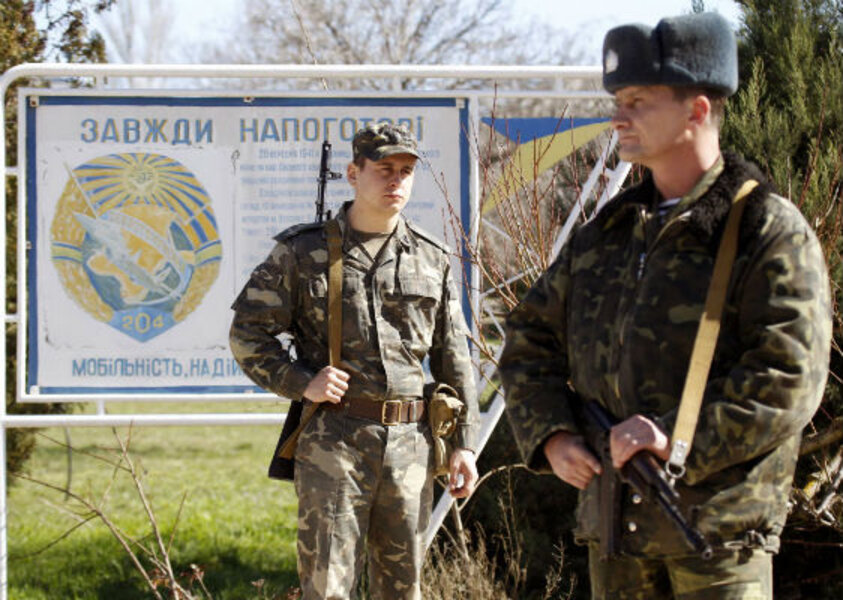Putin tightens grip over Crimea as Ukraine conflict hits Russian markets
Loading...
Russia's foreign minister spoke out against what he said was Western disregard for the Ukrainian public, as the US and Europe voiced disapproval of Russian military intervention in Ukraine.
Sergei Lavrov, speaking at a UN human rights meeting in Geneva, said today that Ukraine's Russian-speaking population was facing "ultra-nationalist threats" from forces that ousted and impeached former Ukrainian President Viktor Yanukovych last month.
Mr Lavrov said: "The victors intend to make use of the fruits of their victory to attack human rights and fundamental freedoms of minorities.
He said the "violence of ultra-nationalists threatens the lives and the regional interests of Russians and the Russian speaking population."
As such, Mr. Lavrov said, Russia would maintain control "until the normalization of the political situation," reports the BBC. Reuters notes, however, that Lavrov maintained the Kremlin line that Russian President Vladimir Putin has not yet decided to send troops into Ukraine, despite widespread evidence that the soldiers who now control most of the Crimean peninsula are Russian.
The BBC notes, however, that Lavrov's comments contrasted sharply with an earlier version submitted to journalists, which said that "military interventions on the pretext of civilian protection produce the opposite effect."
The Associated Press reports that, according to US officials, some 6,000 Russian troops are now in Crimea, giving the Kremlin complete control of the region. And reports suggest that additional troops may be inbound. Soldiers speaking Russian and driving vehicles with Russian license plates have seized the ferry terminal in the Ukrainian city of Kerch, at the eastern tip of Crimea, just a few miles across the Straight of Kerch from Russia.
For its part, Ukraine has begun mobilizing its military by calling up reserves, nominally 1 million soldiers, though The Telegraph notes that most observers don't see it as a viable match for Russia. Furthermore, the Ukrainian military appears to have divided loyalties. Over the weekend, the head of the Ukrainian Navy, Denis Berezovsky, defected to the "Autonomous Republic of Crimea." And Russian news agency Itar-Tass claims that 3,000 more soldiers and security officers have sworn allegiance to Crimea as well.
Western options so far appear to be limited to diplomatic overtures and rebukes. British Foreign Secretary William Hague warned that "there will be consequences and costs" for Russia's actions in Ukraine, reports Agence France-Presse. Mr. Hague, who is in Kiev today, said that military intervention "cannot be the way in the 21st century to conduct international affairs." Yet he ruled out any military response to Russia.
The primary tool that the West appears to be able to wield against Russia is the ability to inflict economic repercussions. The Group of Seven top industrialized nations warned that it was halting preparations for the Group of Eight summit – consisting of the G-7 and Russia – scheduled this summer in Sochi, due to the Kremlin's intervention.
The statement was signed by the leaders of Britain, Canada, France, Germany, Italy, Japan, the United States, and the presidents of the European Council and European Commission, and was released by the White House. It announced the leaders' resolution to “condemn the Russian Federation’s clear violation of the sovereignty and territorial integrity of Ukraine, in contravention of Russia’s obligations under the UN Charter and its 1997 basing agreement with Ukraine.”
“We call on Russia to address any ongoing security or human rights concerns that it has with Ukraine through direct negotiations, and/or via international observation or mediation under the auspices of the UN or the Organization for Security and Co-operation in Europe,” the statement said.
The G7 also promised to press for financial aid for Kiev, which is facing an economic precipice, though it offered few details apart from expressing support for the necessary Ukrainian reforms required by the International Monetary Fund. "IMF support will be critical in unlocking additional assistance from the World Bank, other international financial institutions, the EU, and bilateral sources," the statement said.
The economic repercussions for Russia may also come through the market's own motions. Reuters reports that Russian assets dropped dramatically in today's trading over concerns about the Kremlin's Ukraine moves. The ruble dropped to all-time lows against the dollar and the euro. Russia's central bank issued a surprise increase in a key interest rate in response, to prevent "risks to inflation and financial stability associated with the recently increased level of volatility in the financial markets."








